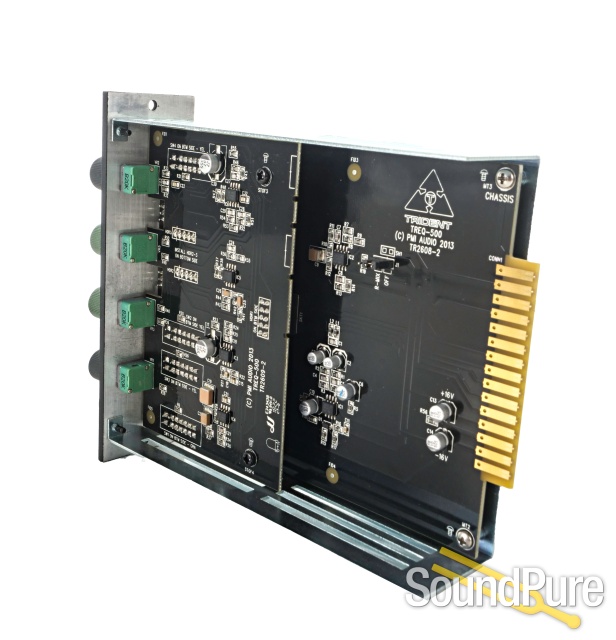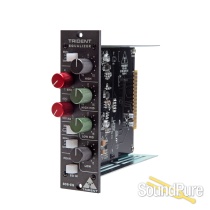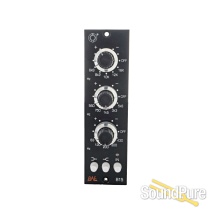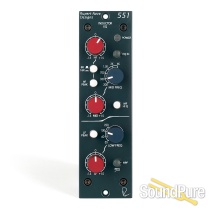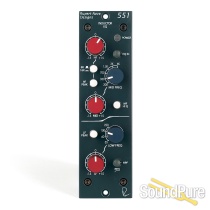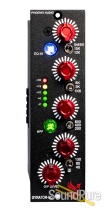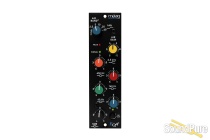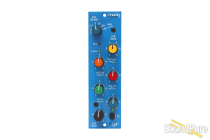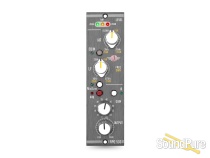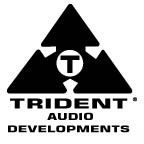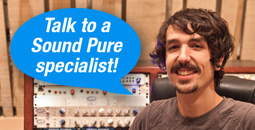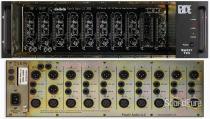-
Call Us Toll Free888-528-9703
-
Local/International (+1)919-682-5552
- Call Us! Toll Free! 888-528-9703
- Local / International (+1) 919-682-5552

Trident 80B 500 Series Equalizer - Used From Trident
The Hi-Lo is not just a filter. Trident Audio has created an analog adaptive filtering circuit for the 500 Series format. In Used, Excellent Condition
"Gone, Baby, Gone"
This one is sold. Don't miss the next one. Some things never even make it to the site so stay up to date on our used collection.
We get in many oddities, rare and vintage products, most of which go fast. If you're on the hunt for something specific, something unique, or something priced right, let us notify you on our used collection before the items even hit the site.
Want to know if one lands?
Notify MeWant to discuss what's coming?
Manufacturer's Description from Trident
Features
- Four Band Eq
- Sweepable Mid Bands
- Lo Freq can be switched between 60 and 120Hz
- Hi Freq switchable between 8 and 12KHz
- Lo Mid sweepable from 100 to 1.5KHz
- Hi Mid sweepable from 1 to 15KHz
- 50Hz Hi Pass Switch
- Peak Overload LED
- Bypass Switch
The Series 80B 500 Series EQ incorporates a classic four band equaliser which is identical to that employed in the Trident Series 80 console. It consists of frequency switchable high and low pass shelving sections, coupled with two swept low and high mid range bands and a switchable 50Hz, 12dB per octave filter. Both swept midranges have been carefully chosen for maximum effect on music programme and a good degree of overlap is provided.
Begin with all boost/cut controls – those with centre detents, set to their mid way (‘0’) positions. Adjust the low and high mid frequency sweep controls to their minimum positions (fully anticlockwise). The50Hz high pass ‘Filter‘ switch should be in the out position. Set the frequency select switches controlling the high and low shelving sections, to 120Hz and 12kHz respectively. Lastly, set the ‘EQ’ switch to the ‘in’ position (the associated LED will illuminate).
Rotation of the high frequency shelving control in a clockwise direction emphasises high frequencies, while turning the control in an anti-clockwise direction from centre attenuates high frequencies.
Operating the ‘frequency select’ switch in the high frequency section introduces a subtle change of emphasis to the affected high frequencies, as the shelving ‘knee’ is changed from 12kHz to 8kHz. Likewise, rotating the low frequency shelving control in a clockwise direction will emphasise low frequencies, while turning the control in an anti-clockwise direction from centre attenuates low frequencies. Adjusting the ‘frequency select’ switch in the low section introduces a subtle change of emphasis on the affected low frequencies by altering the shelving point from 120Hz down to 60Hz.
The ‘low mid’ and ‘high mid’ equaliser sections are peaking filters. Adjustment of their parameters is achieved by use of the boost/cut knob and its associated frequency sweep knob. Boost or cut of a given frequency is performed by moving that control from its centre detent position: clockwise for boost, anti-clockwise to cut. The frequency to be boosted or cut is selected by the frequency sweep control knob. The range of frequencies of the ‘low mid’ control extends from 100Hz up to 1.5kHz.
For the ‘high mid’ sweep, the frequency range begins at 1kHz (overlapping with the low mid section) and continues up to 15kHz.
The Series 80B 500 Series EQ incorporates a classic four band equaliser which is identicalto that employed in the Trident Series 80 console. It consists of frequency switchable high and low pass shelving sections, coupled with two swept low and high mid range bands and a switchable 50Hz, 12dB per octave filter. Both swept midranges have been carefully chosen for maximum effect on music programme and a good degree of overlap is provided.
Finally, selecting the ‘Filter’ switch introduces a smooth, 50Hz, 12dB/octave roll-off to effectively eliminate ‘rumble’ caused by, among other things, someone’s feet moving about near a microphone stand, nearby traffic noise and AC systems. The amount of boost (accentuation) or cut (attenuation) that is applied to the audio signal is entirely dependent on the programme content and it is not our intention to advise on this. Application of equalisation is a very subjective matter and is best learned by experiment. The equaliser bypass switch ‘EQ’ is a useful facility for comparing the signal before and after the application of equalization.
The Series 80B-500EQ is derived from the legendary Series 80B Consoles designed by Trident Audio Developments in the late 1970’s. It incorporates an exact replica of the equalizer design that gave the original console its unique sound. These consoles have been used to record just about every major artist in the past three decades, including Elton John, Dire Straits, David Bowie, Rod Stewart and Stevie Wonder to name but a few. More recently they have been used to record artists such as Radiohead and Pavarotti.
The Trident Audio Developments Series 80B-500EQ unit brings with it a historic pedigree and is offered at a price that is now affordable to all studios and home recordists.
The sound and the circuitry of the consoles used to record countless hit records.
In the late ’70s Trident Audio developed a new series of recording consoles to update Trident’s sound for a new generation of musical talent. The result was the Trident Series 80, the sound of which quickly became a favorite among the top artists. The Series 80B doesn’t just capture the sound of these legendary consoles, it is the exact same painstakingly re-created circuitry.
The Series 80B iconic 4-band equalizer lets you tune your sound to perfection.
The Series 80B-500EQ is one of Trident’s most sought after 4-band equalizers. Loaded with frequency-switchable high and low shelving sections, as well as sweepable low-mid and high-mid bands and a switchable 50Hz, 12dB per octave filter, the Series 80B gives you an exceptional degree of control over your sound. The Series 80B’s highly resonant Q peaks are particularly favored by many top engineers for tuning instrument tones.
Specifications
Input Impedance 10 kilohms
Max Input +27dBu
Max Output +27dbu (Into 600ohms)
Distortion (+10dBu Out) 0.0031% (20Hz to 20kHz)
(Hi Enabled Max Freq)
(Lo Enabled Min Freq)
Distortion (+20dBu Out) 0.0069% (20Hz to 20kHz)
Frequency Response 15Hz to 60kHz (-3dB)
Noise (20Hz to 20kHz bandwidth limited)
No Filters in circuit (Residual Noise) -95dBu
High Cut Enabled
Freq Max -83.5dBu
Freq Min -90dBu
Freq Max – 24dB/Oct Slope Enabled -80dBu
Freq Min – 24dB/Oct Slope Enabled -90dBu
Freq Max – Res Enabled, Resonance Min -83.5dBu
Freq Max – Res Enabled, Resonance Max -72dBu
Freq Max – 24dB, Res Enabled, Res Max -71dBu
Freq Min – Res Enabled, Resonance Min -90dBu
Freq Min – Res Enabled, Resonance Max -90dBu
Freq Min – 24dB, Res Enabled, Res Max – 90dBu
Low Cut Enabled
Freq Max -83dBu
Freq Min -86dBu
Freq Max – 24dB/Oct Slope Enabled -83dBu
Freq Min – 24dB/Oct Slope Enabled -90dBu
Freq Max – Res Enabled, Resonance Min -84dBu
Freq Max – Res Enabled, Resonance Max -72dBu
Freq Max – 24dB, Res Enabled, Res Max -73dBu
